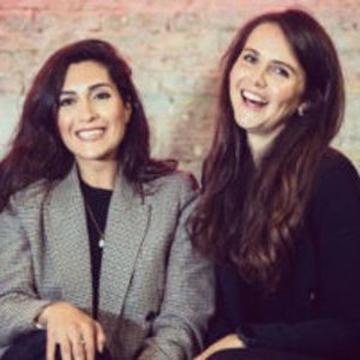Jasmine Schembri and Jo Goodall, co-founders of Luna

Jasmine Schembri and Jo Goodall are the Co-Founders of the Luna App which aims to support teens through these formative years by building a platform that disrupts the way puberty is taught, talked about and experienced.
What is your background? What made you decide to get involved in supporting entrepreneurs?
Jasmine: Jo and I both met on our MBA course, but prior, we had both worked as consultants but wanted to do something more entrepreneurial. Going way back, when we didn’t know each other, we were both entrepreneurs in the playground: washing cars for parents, selling sweets, that kind of thing. We also both came from a family of entrepreneurs. But, after graduating from the University of Oxford, launching a start-up wasn’t normalised. So returning to the business MBA was a really good way of retraining ourselves, finding an idea and a brilliant co-founder.
Jo: Jasmine and I met doing our MBA. One of our modules, the ‘Entrepreneurial Project’ akin to Dragon’s Den, we had to form a team of five and pitch our idea to investors. At the start, we got together as a group and decided to look at what problems affected us currently and then more specifically what problems affected us now that we didn’t know about when we were younger. For example, problems such as polycystic ovaries, or fertility problems. Would it have made a difference if we knew about these issues when we were younger? We don’t know, we can’t go back, but we did visit our old schools to see if anything was different. It wasn’t. Sex and puberty education was still very basic and very minimal. We didn’t come from a generation of social media, but these teens do. There is a lot of misinformation on the internet which makes things even more difficult and this is where our first idea of Luna came from. We wanted to help female assigned teens people understand how to manage their periods. However, when we spoke with the students we also learned they wanted something that helped inform them on information beyond just their periods. They also wanted something that helped with sleep, stress, mental health and exercise. So that’s when we altered the idea in October 2021 to take a more holistic approach.

Jasmine: Entrepreneurship is finding a problem or opportunity and making something of it. Your idea can be big or small. I think entrepreneurship is hustling. Find a goal, and it can be anything, it can be for profit, impact or a solution. Entrepreneurship is non-stop and it consumes you day-in-day-out. But it’s worth it, because you’ve hustled and you’ve done something.
What would you say are the top 3 skills that needed to be a successful entrepreneur? Why?
Jasmine: Bravery is definitely one, because business is definitely risky, especially as founder.
Jo: Also being determined, and resilient. Not willing to give up. You can have the best idea in the world, like Uber, but even for them it was difficult in the early days.
Jasmine: I think the third thing would be passion. You start your venture not to run for the next few days or weeks, but for the next ten years. You have to be passionate to bring people on your team, and to keep them interested. You will be dreaming of it, having nightmares about it. You need to be brave, determined, and passionate.
What is your favourite part of being an entrepreneur?
Jasmine: So far, my favourite moment has been launching the Alpha version of the app and receiving the positive feedback from it. Teenagers validating your idea and the sense of having a positive impact was really fulfilling. We sourced all the content for the app ourselves, and we have seen they have since used the app. We know it is something people want.
Jo: Especially with the pilot app, we didn’t know who these teenagers testing the app were. They weren’t family, and they weren’t just saying it was great because they knew you personally.
What individual, company or organization inspires you most? Why?
Jo: I listen to a lot of business and start-up podcasts. They have amazing guests like founders of lesser known companies. It is amazing how these businesses fly under the radar. Stephen Bartlett for example, the new Dragon’s Den investor, spent ten years working away and built a multi-million pound empire. Yet, no one really heard about him until a few years ago. He was a University dropout and comes from a minority background, so it is great to look up to people like him, and know that I can do it too. Also, from the everyday, my parents. My Dad built his own business from scratch and so I find him a great inspiration.
Jasmine: Sharmadean Reid of Stack World and Tania Boler of Elvie; both incredible women who have disrupted quite traditional industries and brought women together through their products.
If you had 5 minutes with the above individual/ company/organization, what would you want to ask or discuss?
Jo: Lots of questions. There’s no handbook for start-ups, its not like a job where you have a line manager. It would be useful having someone you can ask technical questions.
Jasmine: I’d ask about resilience, it’s really hard. I don’t know how you build that. How not to be crushed when someone says no. I would specifically ask them how to balance being a mother, and being an incredible CEO. I would like to see more examples of that. I want to see more stories like this to inspire other women out there to help them realise entrepreneurship and motherhood are not mutually exclusive.
What has been your most satisfying or successful moment in business?
Jo: The first email feedback on how the app was amazing. The teenagers even provided extra feedback on the features they would like to be added which really showed how they were engaged and on the journey with us.
What would you say have been some of your mistakes, failures or lessons learned as an entrepreneur?
Jasmine: That is a tough one because we are still quite early on in our journey. I don’t think there have necessarily been mistakes (that have materialised just yet) but there are things we could definitely have done differently.
Jo: In October to December we were visiting schools, and it is always possible to say we could have done more research. There is always room to do more, but there is not always the time.
Jasmine: Maybe building on that, a lesson we learned as overachievers, is that we exert a lot of pressure on ourselves. Which is often a good thing, but we can be quite hard on ourselves. When there are only two of us, we need to prioritise our work and learn that it’s not going to be possible to execute every suggestion that someone tells us about.
If a new entrepreneur or startup came to you looking for entrepreneurship resources, where would you send them?
Jasmine: Make sure you have an awesome co-founder. This is a wild ride. You need someone you can speak to everyday, cry and talk to. Some people say you need to have complementary skills, but we Jo and I have quite similar backgrounds. You can hire someone in to fill in that gap. What we do have are complementary personalities and a solid business partners relationship which in my view is what establishes a good early business partner relationship.
Jo: It is amazing what people do as co-founders. It is impressive as a solo-founder to do it yourself. At this early stage, the team is the most important thing. If the app had flopped, we could have pivoted because we had invested our time in each other. That is the critical thing early on. Think of it like marriage. You can change, adapt and pivot around everything. Even with the best idea, with the wrong person it will not happen.
Have you faced any challenges as a woman entrepreneur? If so, how have you overcome them?
Jasmine: I think what we are building has been largely well-received by the typical investor, the majority of which today are men, though this is changing. No one has yet shut it down or refused to listen and so we are staying positive. I do however think there are challenges around being in the right circle of investors. Not being in big networks, but I think that comes more from being a first-time /gen university student and first-time founder as opposed to being a woman. Breaking into those big circles is a challenge.
Jo: I agree. I think there are two times in our lives it will show more. Now, in the initial investment period, but we are currently only seeking small amounts of funding. I think there will be more issues at the big investment rounds. This may happen when the Luna babies are around. In past, women have had to hide their pregnancy bumps when seeking investment, because they’re afraid the investor may not think they will be around for long. I think if there will be any problems they will come further down the line. We’re shocked that this is still an issue today.
What resources would you recommend for other women?
Jo: I wish there was a start-up handbook. But there’s no right way and everyone’s journey is different. The theory from the MBA has really been useful and the Business school in sending resources. But it comes from other people sharing their knowledge, it’s all about networking.
How could institutions such as the University of Oxford better support women entrepreneurs?
Jasmine: I like the idea of a mentor, and more of matching with mentors. Something to bring females together, and I know pockets of organisations do that, but nothing at a holistic level. But I would say we have been very supported by the business school.
Jo: The business school have the entrepreneurship centre, and we are also in a wider Oxford network. You can’t teach entrepreneurship but you can put in the surrounding institutions and people to help.
Any last words of advice?
Jasmine: If you have an idea and a few hours spare, try and do something with it. It definitely gets harder to kickstart something as you get older because once you’ve been in a job and you’re earning a good salary it is harder to leave that and take a high risk job. If you have an idea, try and test it through focus groups, or a small survey, talking to people, and use those extra hours to make a basic version of it. If that gets traction and if you want to spend more time on that idea, then take the risk. There is no right time to be an entrepreneur. ‘Have confidence,’ is what everyone keeps saying to us. Say things with confidence and sell you product. Keep injecting in that confidence in you when things get tough.
Jo: On the flip side entrepreneurship is not for everyone and that’s okay. It’s not the only option, but if you know someone who wants to do it, be a supporter. Like stuff on Instagram, it all helps. You can be part of the entrepreneurship world by offering to help at a stand and being an advocate of women in business as well.
Share this
More news



